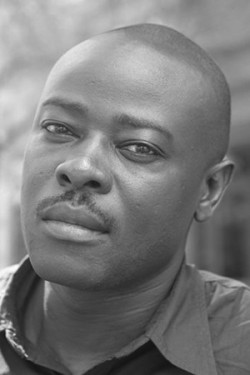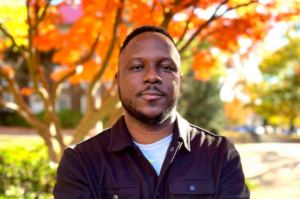For all those who have dreamed of reading or writing African crime and spy fiction, your day has finally come with the recent launch of Cordite Books.
You’ll enjoy this must-read interview of Helon Habila. He talks about his work as the editor of the Cordite Books crime imprint. He also makes some of the most illuminating and provocative observations about contemporary African fiction.
Habila is the author of Waiting for an Angel, Measuring Time, and Oil on Water. He teaches creative writing at George Mason University in the United States.
I think, if you want to capture the African zeitgeist, the spirit of the times, you can do that best through crime stories. — Helon Habila
Ainehi Edoro: What inspired your interest in crime/spy writing and in the business of publishing crime fiction?
Helon Habila: Like most Nigerians of my age I grew up reading, not Achebe and Soyinka, but James Hadley Chase, and Nick Carter, and Desmond Bagley, and John D McDonald. We used to buy them for a few naira from the bend-down book vendors. We also had a sort of informal book club, reading by turns, one book would go round the whole school, and by the time it came back to the owner it was torn and the spine broken, and the pages had to be glued back together. Come to think of it, my interest in crime fiction goes back to my first day in Secondary School, we were sent to the library where I discovered the Nancy Drew series, I finished the whole series in weeks.
The second part of the question, about publishing as a business, well, I am not interested in it as a business per se, but in order to disseminate something, to distribute it, one needs organization, meaning it has to be set up as a business. So, to get a book from writer to reader you have to set up a company that does just that, and here we are, in the business of publishing. I don’t know much about that aspect of things, my partners, Richard Ali and Azafi, handle that part. Basically Cordite intends to popularize African crime and spy fiction. But first we want to launch the crime aspect first, which I will edit, as a sort of pilot project. The spy aspect will follow. It will be handled by Richard, who is a spy fiction enthusiast.
AE: Cordite Books is clearly ready and open for business. Your website is clean and classy and the call for submission has been well publicized. Can you tell us a little bit about the publishing company, where it’s based, and so on? Perhaps also say a few things about the brand? What does Cordite mean?
HH: I am glad you like the website – that is more a credit to the website designers than to Cordite. I like it too. It is a testament to the talent and industry of young Nigerians doing things by themselves and for themselves everyday.
What does Cordite mean? Actually Richard came up with that name. Cordite, I believe, is a sort of smokeless gunpowder, with a rather distinct smell. We toyed with many names before settling on that. Cordite is a metaphor for crime. We love it, it is exactly the kind of imagery we were looking for. Ours is an interesting partnership: Richard is the creative partner; Azafi is the business woman; and I will be the talent scout if you like. Our aim is to discover and promote African crime stories. We believe there is the talent, and the readership, to make that work.
AE: D. O. Fagunwa says in a 1960 essay published in Teacher’s Monthly that “the aim of a novelist is to present to the public something interesting to read, and the success or failure of a novel lies in how far it can get a hold of its readers and compel them to read on.” The popularity of his own writings testifies to this statement. Do you see your interest in crime fiction as staying true to this mandate of literary entertainment, something that has generally been downplayed in African fiction?
HH: I agree with Fagunwa, completely. According to Aristotle, the aim of literature is to entertain and to educate. Unfortunately our “serious” literature in Africa focuses more on educating and has neglected the entertaining part. I don’t want to give the impression that crime fiction is not serious, or cannot be serious. Crime literature has a long genealogy. It goes back all the way to Greek tragedy. Oedipus Rex is about murder, it is detective story per excellence – a man kills his father and marries his mother. The whole story is about uncovering the criminal. This is thriller stuff. The whole community is cursed because of this crime, and the criminal has to be discovered for society to return to normal. This, in a nutshell, is the poetics, the idea, behind crime fiction. There cannot be healing and restoration to normalcy without justice. It is the same idea in every Agatha Christies story, in every Conan Doyle story, and of course in every Ian Fleming story. The detective is the spy, is the hero, fighting a battle on behalf of the whole community, fighting for restoration of natural order.
Can we apply that to the Nigerian, African situation? Yes we can. It has been done before, by Pacesetters. And when you read books like The Last Duty, by Isidore Okpewho, it is a crime fiction. JM Coetzee’s Disgrace is a crime story. Achebe’s No Longer at Ease is a crime story. Basically, a crime story is about crime and detection and punishment.
By starting an African crime imprint we are trying to open up the discussion, to bring it down from the Ivory Tower to the streets, where real people live, where most new trends and ideas begin. We want to ask questions like: what is the state of crime, and justice, and punishment, in Africa today? What is happening in our prisons since the end of colonialism, are they still places of punishment or correction? Why do the rich get away with stealing billions while the poor are hanged for minor crimes? Why do our leaders feel no shame in stealing? Why do our police defend only the rich and not the poor? What is the moral dimension of all this? Africa is the fastest urbanizing continent in the world, with transition from traditional to modern settings there is a shift in the way we perceive crime, from the collective to the individualistic, if you like, but in doing so, are we throwing away our African values? I think, if you want to capture the African zeitgeist, the spirit of the times, you can do that best through crime stories.
I have noticed that there is a huge gap in our reading culture: people are either reading Shakespeare, or Soyinka, or JP Clark, or Ngugi – the so-called highbrow literature – or they are reading non-fiction, mainly of the inspirational, religious kind. There is nothing in-between, at least not by African authors. If they want something light and entertaining they have to go to Nollywood, or foreign crime and spy and romance writers, like Robert Ludlum, and Hadley Chase, and the Scandinavians. But the fact is, we live in crime ridden societies. Why are we not talking about it, why must we always sublimate it into some high art, and not talk about it in direct and simple idiom. Crime and punishment, that is what I am interested in.
AE: You own Cordite Books with Paressia Publishing. How did the collaboration come about?
HH: Well, I did come up with the idea for the crime imprint. I’ve had the idea for a while, but because of my situation: I don’t live in Nigeria, I don’t know the publishing industry that well, etc, etc, I knew I couldn’t do it by myself, so I proposed the idea to my publisher, Parrésia Publishers, and they immediately saw the viability of the idea and agreed to be partners. Cordite Books is a partnership between Decibel Books, my company, and Parrésia. Decibel provides the crazy, wildcard ideas, and Parrésia provides the grounding, the infrastructure – it is a perfect marriage. Parrésia is my Nigerian publisher, a company started by Azafi and Richard and their partners, and the funny thing is that I didn’t even know them that well before we went into business. Azafi I had met perhaps twice while doing the Fidelity Bank Anthology last year, and Richard I knew only by reputation though it turned out that while I attended the University of Jos, he lives in Jos and we have friends in common. Oh, we also found out, much later, that Azafi and I did our NYSC in the same city, Jalingo, Taraba. I in 1996, Azafi some years later.
AE: As one who has until now been a novelist and teacher of creative writing, how has it been like venturing into the business side of publishing?
HH: Well, like you said, I am just venturing into it. We shall see how it turns out. But I believe that good art is like any good product, there can be a market for it. In Nigeria alone we are over 160 million people, that is a big market. Surely it shouldn’t be too hard to sell half a million copies of a book to 160 million people? The whole of Africa is even a bigger market. You can comfortably sell, in Nigeria alone, over 100,000 copies of a book if it is good, if you market it right. Multiply that by ten, twenty, when talking about the whole of Africa. The problem is that western publishers and companies always undermine and underestimate the potential of the African market. As such, they never bother to develop the market. It is too much work. So they always dismiss it, and they tell you Africans don’t read. They don’t buy books. We want to change that. I believe Africans must begin to show more faith, more confidence in the African market. We are starting with the assumption that our primary reader, our primary market is African. We have a burgeoning middle class, we are more educated than we have ever been in history, the whole world is cottoning on to that, the Chinese seem to be aware of that more than we are, we Africans should lead the way. Our writers and intellectuals and business people must begin to think Africa, to behave as if their only market is Africa, to believe in Africa.
AE: Since the Pacesetter days, Nigeria has not really had a thriving genre fiction scene. Do you see the founding of Cordite Books as marking a resurgence of the form?
HH: Honestly, I am puzzled as to why we haven’t had a repeat of the phenomenally successful Pacesetters series. This was when the whole country was reading, following each publication, then suddenly it stopped. I still believe there is a huge vacuum for that kind of fiction, the popular, the immediate, the visceral. It has been done before, our aim in Cordite is to do it again, a sort of modern version of it. Only our aim is wider, more ambitious.
We still have crime in our midst. We still have victims. We still have perpetrators. What we need to create is the idea of heroes. People who are willing to buck the trend, to stand up for what is right, to purge out evil from the body politick. Our police can’t do it, because they are unwilling, and they don’t seem to even understand the idea of heroism, of standing up for what is right. What crime fiction does, and most of literature, is to create that idea of the hero, to convince us that we can all be heroes, a kind of DIY hero, if you like. Today we speak of Spiderman, and Superman, etc, as if they are real people – but they are fictional heroes, from comic books, fighting crime, purging the society of evil and restoring it to health. Children grow up reading them, and they fall in love with the idea of standing up for others, for the weak, of sacrifice, and they learn to hate evil.
AE: Why do you think Africa has not really made its mark on the global genre fiction scene? We’ve done amazing things in the highbrow side of things, but it looks like we are lagging behind in more popular sort of writing. Any thoughts?
HH: I guess it is a result of our education, our colonial education system. Most of our university trained writers aspire to write like Shakespeare and Dickens – they write only for the elite. Perhaps I am also guilty of being in that category. Other writers, like Ekwensi and Tutuola, and even Saro-Wiwa, we push aside as being too simple. But if you look at these so-called “simple” writers you will see they are in touch with our day to day concerns even more than writers like Achebe and Soyinka and Ngugi are. To go back to the example of Oedipus Rex, read it and you will see that it came from mythologies and folklores of the Greek, their day to day concerns about life, and religion, and family, and communal survival – this is what all good crime fiction talks about. So, my point is, we have as much raw material to create a market for crime fiction as any other nation, say Sweden, which is seen as the number one producer of crime stories. The joke is that these peaceful Nordic societies don’t even have the same volume of crime as we do. Perhaps the reason is in Africa we are scared to talk about it, to question it, to challenge it, like other nations do. Our leaders want us to believe that Africans are a peaceful, forgiving people, that God will give us justice someday if we don’t get justice here on earth. Crime fiction questions that kind of morality. Crime fiction tells you that you need to have justice here on earth if you want a truly just society. Crime fiction doesn’t believe that there can be peace without justice. These are things we need to talk about.
AE: There’s an Ian Fleming reference somewhere on the Cordite Books website. Does the James Bond series epitomize, for you, what good crime writing is? In other words, what would good crime writing do or look like vs. one that isn’t so good?
HH: I think of crime fiction as popular fiction, just like a folk tale is: it talks to the people about the things that matter to them most, their safety, their corporate and individual survival, the question of their rights as citizens. But it must do so in a direct, entertaining way. So, we want good plotting, suspense, direct diction, and of course, a satisfying, unexpected but logical ending. Having said that, it looks to me as if I am talking about any good fiction. But let me just add that, crime fiction has to be about a crime: murder, kidnapping, blackmail, hit and run, etc, etc, and how that is eventually uncovered. We don’t want to be prescriptive, but we’d love it if these stories are set in an urban place. Urbanity, modernity, these are things we want to talk about, to promote as an aesthetic, if possible.
AE: What’s the publication time line? From the moment you get your winning manuscript, how long before the official release of the title?
HH: Submissions are open from August 7th, 2013 and will close on November 30th, 2013. The winning manuscript will be published mid 2014, around July.
AE: Tiny bit of clarification: there are three prizes, but only the winner of the first prize gets published, right?
HH: There will be three prize winners. The first two will get published by Cordite, but only the first place winner gets 1000 dollars cash prize; the second will also be published and receive 250 dollars while the third place manuscript will receive 200 dollars. There will be honorable mention for the fourth and fifth best manuscripts received.
AE: How optimistic are you about the whole enterprise? Are you set to find us an African Ian Fleming or Agatha Christie?
HH: Very. Very optimistic. But ours is not a simple, blind optimism. We have watched carefully how fast Africa is changing, and how other things need to change as well. Like the way publishing and distribution works. There is an emerging middle class whose tastes are the same as any middle class in the world, and they need a literature to address their day to day issues. To show you how viable this idea is, it has only been a week since we sent out our advert, and already we have publishers from different countries wanting to partner with us. There is a demand, what there hasn’t been is supply. We hope to take care of that.
Interested in becoming a Cordite crime/spy writer, get more information HERE. Follow Cordite Books on twitter: @CorditeBooks
Image: Helon Habila (c) Jide Alakija










Cordite da su primer paso junto a Blessing Musariri | actua y comunica December 29, 2014 11:35
[…] Helon Habila ha mostrado su confianza en el potencial de la novela negra de autores africanos, más allá de la evidente apuesta de embarcarse en un proyecto como Cordite Books. En este sentido, el escritor nigeriano ha explicado sus motivaciones, defendiendo que este género puede constituir la punta de lanza de una novela ligera que considera escasa en el panorama de las literaturas del continente. “Me he dado cuenta de que hay una enorme brecha en nuestra cultura de la lectura: la gente puede leer a Shakespeare, a Soyinka, a JP Clark, o a Ngugi, lo que se considera literatura culta, o que literatura de no ficción, sobre todo, la de inspiración de tipo religioso. Y, sin embargo, no hay nada en el medio, por lo menos no por parte de autores africanos. Si quieren algo ligero y entretenido sólo tienen la posibilidad de dirigirse a Nollywood, o la literatura de misterio y de espionaje extranjera, o a la literatura romántica”, explicaba en una entrevista publicada en Bittle Paper. […]